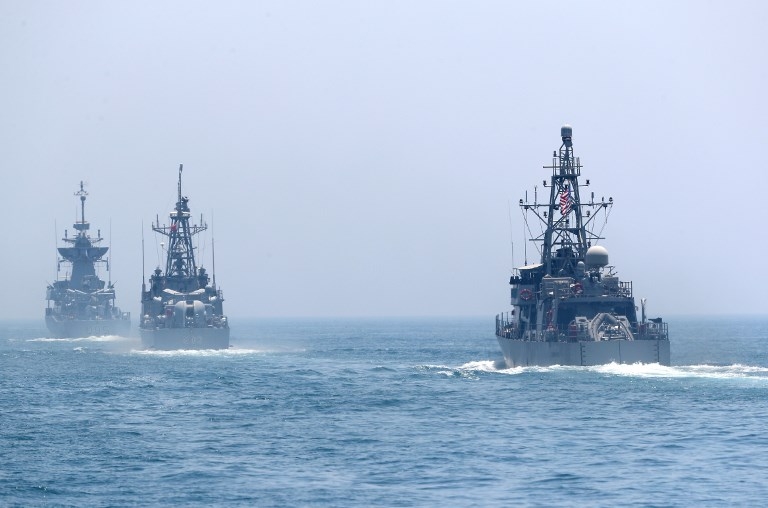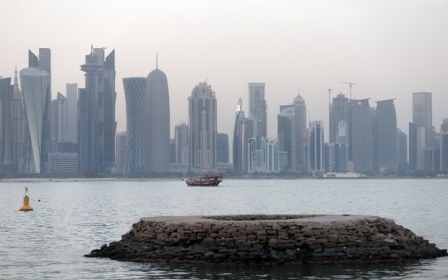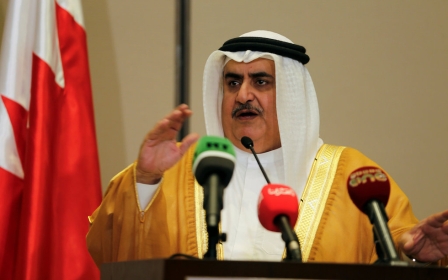Qatar's foreign minister seals $6bn warship deal with Italy

Qatar has concluded an almost $6bn deal with Italy for seven warships, the Qatari foreign minister said on Wednesday, part of a military cooperation agreement between the two countries.
The deal marks a significant modernisation and increase in Qatar's naval capabilities. It will go some way towards closing the capability gap between the isolated Gulf nation and other regional powers, including Iran and Saudi Arabia.
Mohammed bin Abdulrahman al-Thani made the announcement at a news conference with his Italian counterpart Angelino Alfano in Doha after talks about efforts to end a rift between Qatar and four Arab states.
"I am pleased to announce the conclusion of a deal between the Qatari emiri naval forces to buy seven naval units from Italy in the context of the joint military cooperation between the two countries," Sheikh Mohammed said.
He said the deal was estimated at $5.9bn but gave no further details and did not identify the companies involved.
It is understood the announcement relates to a deal first outlined last year by Italy's state-controlled shipbuilder Fincantieri.
At the time, Fincantieri said it would supply the Gulf Arab state with four 3,000-tonne corvettes, two 700-tonne offshore patrol vessels and an amphibious landing platform dock, along with support services in Qatar for 15 years after delivery.
Currently Qatar's navy is made up of 20-year-old patrol vessels and unlike regional powers Iran and Saudi Arabia, it lacks full-sized modern warships.
All the ships will be built in Italian shipyards, with construction starting in 2018, it said. Italian defence company Leonardo will supply electronics and weapons systems for the ships and receive about a third of the value of the deal, a company official said at the time.
Qatar is embroiled in a dispute with Saudi Arabia, Bahrain, the UAE and Egypt, which accuse it of supporting Islamists and regional foe Iran, charges Doha denies.
The countries cut air, sea and land links with Qatar, leaving the country isolated amid its former Gulf allies.
The seven-vessel deal comes as Italy and Qatar continued to move towards closer military ties.
In March, the heads of Qatar and Italy's navies signed a deal for the training of Qatari sailors ahead of the delivery of the warships. The training deal covers the enrolment of Qataris at Italian navy training centres, the embarkation of Qatari officers on Italian warships and the dispatch of an Italian naval liaison officer to the Qatar naval headquarters in Doha.
The following month, the Italian frigate Carabiniere visited Doha in a sign of on-going naval co-operation between the two countries.
Even with the order of the ships Qatar's naval forces will still be smaller than the naval forces of Saudi Arabia, UAE and Bahrain. Qatar's fleet, though, will be more modern and boast a new amphibious land capability.
Qatar introduces new permanent residents
Meanwhile, Qatar, currently boycotted by four Arab states, on Wednesday created a new permanent residents status for certain groups of foreigners, including those who have worked for the benefit of the emirate.
In a first for the Gulf, Qatar's cabinet ministers approved the measures, the official QNA press agency reported, in a move that will likely affect tens of thousands of resident foreigners.
Under the new rules, children with a Qatari mother and a foreign father can benefit from the new status along with foreign residents who have "given service to Qatar" or have "skills that can benefit the country," the agency said.
A specially created interior ministry commission will decide individual cases, according to the Qatar News Agency.
Those deemed eligible for the new status will be afforded the same access as Qataris to free public services, such as health and education.
They will also receive preferable treatment for jobs in the administration and armed services as well as being able to own their own properties and exercise some commercial activities without the need for a Qatari partner.
New MEE newsletter: Jerusalem Dispatch
Sign up to get the latest insights and analysis on Israel-Palestine, alongside Turkey Unpacked and other MEE newsletters
Middle East Eye delivers independent and unrivalled coverage and analysis of the Middle East, North Africa and beyond. To learn more about republishing this content and the associated fees, please fill out this form. More about MEE can be found here.




